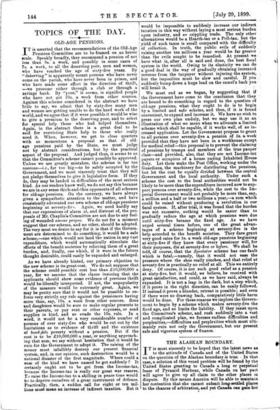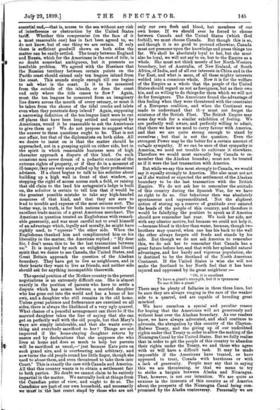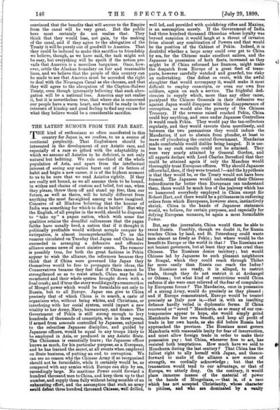THE ALASKAN BOUNDARY.
IT is most sincerely to be hoped that the latest news as to the attitude of Canada and of the United States on the question of the Alaskan boundary is true.. In that case, a solution of this vexed problem will be found by the United States granting to Canada a long or perpetual lease of Pyramid Harbour, while Canada on her part will agree to give up all claim to the other places in dispute. By this means America will be able to maintain her contention that she cannot submit long-settled places to the chances of arbitration, and yet Canada can gain her essential end,—that is, access to the sea. without any risk of :interference or obstruction by the United States tariff. Whether this compromise (on the face of it a most reasonable one) has in fact been agreed to, we do not know, but of one thing we are certain. If only there is sufficient goodwill shown on both sides the matter can be easily settled. The treaty between England and Russia, which for the Americans is the root of title, is no doubt somewhat ambiguous, but it presents no insoluble problem. We agreed with the Russians that the Russian territory between certain points on the Pacific toast should extend only ten leagues inland from the coast. This sounds simple enough till one begins to ask what is the coast. Is it to be measured from the outside of the islands, or does the coast end only where the tide ceases to flow ? Again, must the ten leagues be measured from an imaginary line drawn across the mouth of every estuary, or must it be taken from the shores of the tidal creeks and inlets even when they penetrate deep inland ? Again, supposing a narrowing definition of the ten-league limit were to cut off places that have been long settled and occupied by Americans, would it be reasonable to ask the Americans to give them up ? We do not propose to suggest what the answer to these questions ought to be. That is not our affair, but that of the diplomatists on both sides. All we desire to insist on is that the matter should be approached, not in a grasping spirit on either side, but in the spirit in which reasonable business men of high character approach a dispute of this kind. On such occasions men never dream of a pedantic exercise of the extreme rights of property, or if they do in a moment of ill-temper, they are very soon pulled up by their professional advisers. If a client begins to talk to his solicitor about building up a high wall in front of that window, or stopping the right of access across such a field, or raising that old claim to the land his antagonist's lodge is built on, the solicitor is certain to tell him that it would be the greatest possible mistake to take any high-handed measures of that kind, and that they are sure to }'ad to trouble and expense of the most serious sort. The better way, in truth, is for both nations to remember the excellent trade maxim of a great American merchant. The American in question treated an Englishman with remark- able generosity, and was most careful not to avail himself of an advantage which, legally and morally, he might have rightly used, to " squeeze " the other side. When the Englishman thanked him and complimented him on his liberality in the matter, the American replied : "My dear Sir, I don't mean this to be the last transaction between us." It is inspired by such an enlightened and liberal spirit that we desire to see Canada, the United States, and Great Britain approach the question of the Alaskan boundary. They have got to live as neighbours, and in their hearts they want to live as friends, and neither side should-ask for anything incompatible therewith.
The special position of the Mother-country in the present negotiations is an extremely difficult one. She is almost exactly in the position of parents who have to settle a dispute which has arisen between a married daughter who has gone out into the world and has a house of her own, and a daughter who still remains in the old home. Unless great patience and forbearance are exercised on all sides; there is always the likelihood of a very ugly quarrel. What chance of a peaceful arrangement can there be if the married daughter takes the line of saying that she can get on perfectly well with the old people, but that Mary's ways are simply intolerable, and that she wants every- thing and everybody sacrificed to her ? Things are not improved if the home-staying daughter retorts by sneers and by declarations that she supposes she who lives at home and does so much to help her parents will be sacrificed as usual,—` just because Kate puts on such grand airs, and is overbearing and arbitrary, and now turns-the old people round her little finger, though she used to abuse them, and even threatened to take them into Court.' This is exactly the ease with Canada and America. All that this country wants is to obtain a settlement fair to both partiei. No doubt we cannot claim to be entirely impartial in the matter. We naturally look at things from the Canadian point of view, and ought to do so. The Canadians- are part of our own household, and necessarily we nine in the lait resort stand by those who are not only our own flesh and blood, but members of our own home. If we should ever be forced to choose between Canada and the United States (which God forbid), we must choose Canada. But though this is so, and though it is no good to pretend otherwise, Canada must not presume upon the knowledge and press things too far. We shall be absolutely loyal to her, but she must also be loyal, we will not say to us, but to the Empire as a whole. She must not think merely of her North-Western boundary, but of Australia, of New Zealand, of South Africa, of India, and of all our interests in China and in the Far East, and what is more, of all these mighty interests welded into a conscious whole. Now it is for the welfare of the Empire as a whole that the people of the United States should regard us not as foreigners, but as their own kin, and as willing to do things for them which we will not do for foreigners. The Americans found the advantage of this feeling when they were threatened with the constraint of a European coalition, and when the Continent was made to understand that tb iy must not forget the existence of the British Fleet. The British Empire may some day wish for a similar exhibition of feeling. We are perfectly well aware, and perfectly willing to admit, that there we have no need to curry favour with America, and that we are quite strong enough to stand by ourselves ; but that is not the question. Even the strongest rower may be the better for a. certain amount of outer de sympathy. If we can be sure of that sympathy in America, we need not trouble to cultivate it elsewhere. Therefore we would most earnestly beg Canada to re- member that the Alaskan bounder) must not be treated as if it were the last transaction with America.
But while we say this most strongly to Canada, we would say it equally strongly to America. She also must not act as if she wanted or expected the settlement of the Alaskan boundary to be the last transaction with the British Empire. We do not ask her to remember the attitude of this country during the Spanish War, for we have no right to do so. Our behaviour then was absolutely spontaneous and unpremeditated. ' Not the slightest notion of storing up a reserve of gratitude ever entered the heads of the people of this country, and therefore it would be falsifying the position to speak as if America should now remember last year. We took her side, not with any ulterior motive, but because we could not help it, —because blood is thicker than water, because, though two brothers may quarrel, when one has his back to the wall the other always forgets old feuds and stands by his side. But though we do not ask America to remember this, we do ask her to remember that Canada has a great future before her, and that with her splendid natural advantages, and her hardy and vigorous population, she is destined to be the Scotland of the North American Continent. If the United States is wise she will not make the Scotland to her North feel that it has been injured and oppressed by its great neighbour :— " Oh, it is excellent To have a giant's strength, but it is tyrannous
To use it like a giant."
There may be plenty of fallacies in these three lines, but be sure they are always ringing in the ears of ' the weaker side to a quarrel, and are capable of breeding great mischief.
We have ourselves a special and peculiar reason for hoping that the Americans will act generously and without heat over the Alaskan boundary. As our readers know, we have always advocated, and shall continue to advocate, the abrogation by this country of the Clayton- Bulwer Treaty, and the giving up of our undoubted rights under that Treaty in order to allow the making of the Nicaragua Canal by the United States. But we fully realise that in order to get the people of this country to abandon their rights under the Treaty, we and those who agree with us Will have a difficult task. It may be made impossible if the Americans have treated, or have appeared to treat, Canada with harshness or with a lack of generosity. People may say that in saying this we are threatening, or that we mean to try to strike a bargain between Alaska and Nicaragua. That, however, is not our intention. We are quite as anxious in the interests of this country as of America about the prospects of the Nicaragua Canal being com- promised by the Alaska controversy. Personally we are convinced that the benefits that will accrue to the Empire from the canal will be very great. But the public here most certainly do not realise that. They think that they would lose, not gain, by the making of the canal, and if they agree to the abrogation of the Treaty it will be purely out of goodwill to America. That they could be induced to make this sacrifice to friendship we believe, though, as we have said, the task might not be easy, but everything will be spoilt if the notion pre- vails that America is a merciless bargainer. Once, how- ever, settle the Alaskan boundary on fair and reasonable lines, and we believe that the people of this country can be made to see that America must be accorded the right to deal with the Nicaragua Canal as she chooses, and that they will agree to the abrogation of the Clayton-Bulwer Treaty, even though ignorantly believing that such abro- gation will be a national loss. America may not realise it, but it is nevertheless true, that where she is concerned our people have a warm heart, and would be ready in the interests of kinship and good feeling to find any excuse for what they believe would be a considerable sacrifice.




































 Previous page
Previous page